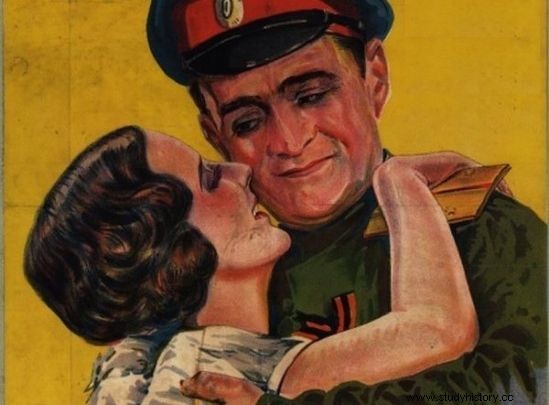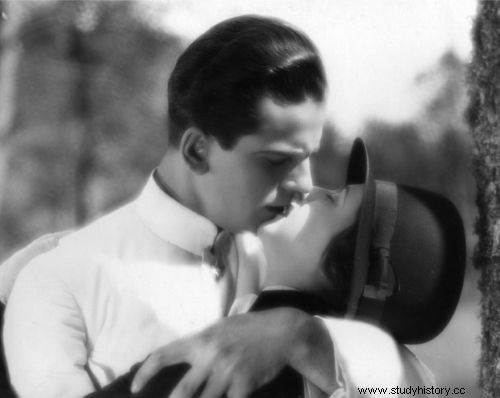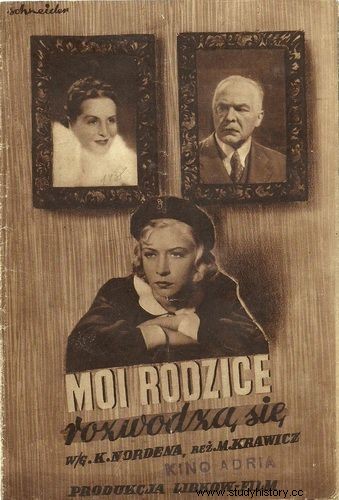The Second Republic was a democratic state, but not entirely. Freedom had rigid boundaries, and any movie lover could find it out painfully.
Those were not easy times for cinematography. The sound films won the hearts of the audience by storm. The first popular productions with a full soundtrack hit theaters in 1927. Five years later, people didn't want to see anything else anymore. Technology struggled to keep up with the expectations of the masses. There were a plethora of problems, but nothing bothered the directors as much as kisses. 
"A real kiss comes out in front of the microphone like thunder or a knife scraping glass, or even like the rattle of a light carriage," explained a tabloid journalist in October 1932, "Good Evening! Red Courier ". - “So far, numerous rehearsals with all Hollywood artists and artists have not helped. Suffice it to say (...) that Ramon Navarro's kiss in the sound film sounds like ... the whistle of steam from an exploding cauldron ”.

Don't kiss! It hurts my ears!
The recipe was developed after many years of efforts:"You have to take a glass plate with an area of twenty square centimeters, coat it thickly by one centimeter with resin and pull it rhythmically with an ordinary cork to make it creak. The sound equipment transforms that creaking into a perfectly passionate kiss. ”
The technique finally allowed the film to contain a scene of true passion. However, it was much more difficult to convince the Polish censorship to allow it to be shown.
Censorship ... at the expense of the censored
The control of the pre-war press operated in the sphere of understatements, informal rules and compromises. In the case of films about any ambiguities, there was no question. On February 7, 1919, Józef Piłsudski issued the Decree on Performances. And, as befits Piłsudski, he was not going to mess with filmmakers. The condition for showing any production was to obtain a special "film card" in the Press Department of the Ministry of the Interior.
Everything was at the expense of the petitioners:officials charged special fees for both censoring the film and issuing the card. Pursuant to Art. 6 bylaws, it was strictly forbidden to show films with "pornographic content and which are contrary to morality or the law at all." It could not be more carelessly. The movie might have been a polite comedy 100% in line with the criminal law, but the terms "in general" and "or" did their job. If the censor did not like the material and did not match his private morality - it ended up in the bin.
Film Ochrana
Similar restrictions could be understood in the conditions of chaos and uncertainty prevailing in the first years of free Poland. All the uprisings, plebiscites and fights with the Bolsheviks drove politicians into a strange state of mind. In 1920, the Sejm even passed an act introducing a partial alcohol prohibition in Poland. However, while this infamous legal junk was never taken seriously, film censorship only grew stronger year by year.
An anonymous group of inept scribers over the years has evolved into a club of hypocrites from political broadcasting who tried to deal cards in the movie world to their liking. Everyone was shaken by Leon Łuskino - a retired colonel known for writing the song Infantry, that gray infantry and out of shocking prudery.

Leon Łuskino. The terror of Polish filmmakers
The weekly magazine "Tomorrow of Work" called his people "the Film Guard". To Antoni Słonimski, they appeared to be the greatest threat to Polish cinematography. In a May 1931 column, he argued that there was nothing worse than "an official acting in accordance with vague regulations or his own cloudy mind. Censorship in Poland is the last resort and there is no appeal against its verdicts, issued with all nonchalance and complete irresponsibility ”.
The columnist calculated that the films were censored of every possible kind:political, moral, military and religious. And even completely brazen artistic censorship. He knew that his readers would not take his arguments seriously. Viewers were not informed about the censorship activity. Everything happened behind closed doors and without any control, and films were released in cinemas without any sense or any resemblance to the originals screened abroad.
In a text from September 1931, Słonimski gave an example of the German production of Spór o serżant Grisza . “It all took forty minutes together. There was no dispute, no sergeant, no Grisha, there was only one "o." If the censorship has left a third of the film, it is simply a scam to show such nonsense for normally costing tickets. We must announce that today half a serving and the ticket price is twenty five zlotys ”- he wrote.
He further added that it would be good "if the viewer, at the ticket price, knew to what extent he was being robbed by deletions." It wasn't necessarily a joke. At least the reader saw white spots in the press - it was implied that censorship had intervened and that something had been cut out. Sometimes he even got the title of the deleted text or two sentences of explanation from the editors. In cinemas, nobody played white tape in place of cut scenes. They just pretended these fragments didn't exist.

A gentle kiss. The peak of passion in pre-war cinema.
Movie subtitles provided room for even bigger scams. In one history film, the censor crossed out the entire sentence about Napoleon Bonaparte's pride. The emperor of the French, he said, was actually very modest. Besides, the Polish national interest does not allow for spreading harmful rumors about allies.
Prudery markers
If that was the case with topics that had been overdue for a century, then what about erotic themes. In the case of foreign production, the censors' scissors became red hot. However, it was with Polish films that the absurdity reached its zenith. Even before the camera went into motion, censors cast themselves as directors. They decided what was allowed in the film, how far the characters could go and what ending the story would be appropriate.
Morally sensitive issues were allowed to be raised as long as in the last scene the characters politely walked down the aisle to get married in a Catholic. Alternatively, the "dirt of everyday life" could be repainted in order to ridicule or stigmatize it at the end of the film. Take, for example, the video My Parents Are Getting Divorced from 1938. At first glance - a realistic picture of the double morality of the pre-war elite.
The wealthy director of the bank, Józef Nałęcz, sleeps with his secretary; his much younger wife Ada gets caught up in an affair with a popular actor. There has been no spark in their marriage for years. They get tired of each other and it's only because of their daughter Stasia. Finally, Ada goes to her lover. Breakup is cultural and completely civilized. Both sides can breathe a sigh of relief. The mother prepares to file for divorce, but at the same time makes every effort not to cut off contact with the child. Father proposes to his own mistress. Everyone wants to go their own way and live on. And it is at this point that the writers, so far down-to-earth, throw all common sense out the window.
"I must not hurt my child like this"
The daughter of the protagonists, close to the age of majority, has a nervous breakdown. She is determined to do whatever it takes to make her parents reconcile. He steals a revolver, has a public row, and makes an inept suicide attempt. It opens the mother's eyes.

My parents are getting divorced! A movie poster with a daughter trying to kill herself ...
“I must not hurt my child like this. I know I upset you a lot about this, but understand, this unpleasantness is so small in relation to this great duty. A mother's duty. Goodbye! " - he says to his partner, who is in love with her. She abandons him and humbly returns home. She condemns herself to the fiction of the family; to live in a relationship with a man he has no feelings for. As long as Stas did not complain anymore. She picked up the music. END. And the moral? Do not try to separate from your husband, because your child is burning in the head. And don't send him to a psychiatrist. Just go to your head and you'll be fine.
Erotic themes could be treated with more frivolity only in comedies. In dramas, they often did not even go beyond ... the title of the film. Polish producers perfectly sensed the market demand. They bought up the rights to screen bold novels. The Story of a Sin hit the silver screen , Girls from Nowolipki , What is not talked about . Only that, under pressure from Łuskina's people, the filmmakers were really afraid to say anything indecent. They didn't even want to think about it. They turned the most scandalous positions of the past epoch, ruthlessly punishing the hypocrisy of bourgeois society, into castrated tales about nothing.
Source:
The article was based on the literature and materials collected by the author during the work on the book The age of hypocrisy. Sex and erotica in pre-war Poland .
You will read in it not only about film censorship, but also about the approach to erotic art, the Polish pornographic industry before the war and the puzzling love of Prime Minister Składkowski for collecting disassembled postcards ...
